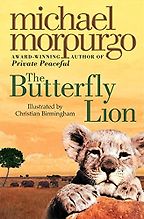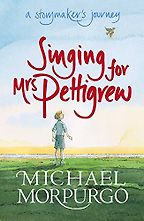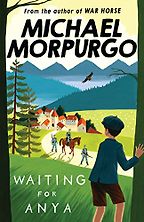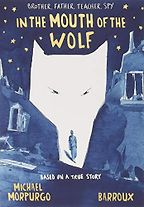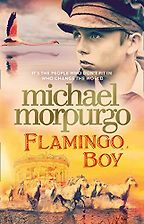You’ve written over 100 books, many of them award-winning best sellers. We’re going to discuss five of your own books that hold particular significance to you.
There are some that when I read them, I think to myself, “You could have done that rather better.” Some, “It’s a good story but you didn’t really make the best of it,” Others, “Well, that’s all right, that still resonates.” The five books here are in that last category.
The First and Second World Wars loom large in many of your books.
Yes. Not for any other reason other than that was the world with which I’m connected—perhaps particularly World War Two. I’m connected by being a certain age and having been born in a certain place at a certain time. Because I lived through the aftermath, through the shadow of war, I came to some comprehension of how it had been for people who had actually lived through it, and died in it. It makes the world we confront every day now more understandable for me, when I think about what’s going on in Europe at the moment. If you don’t relate to your history you simply can’t comprehend what is going on now.
There’s a seriousness to many of your books. They deliver human stories to children very directly.
I am who I am. Writers mustn’t pretend. You mustn’t write a book because you think it might sell; you write a book because you care about the subject.
“If you don’t relate to your history you simply can’t comprehend what is going on now.”
Many writers are people who have great convictions. They write about these convictions. They might have deep sensitivities, or a wacky sense of humour—that’s all part of that same person. That’s just who they are, and if you don’t like it, fine, close the book, read something else. I like that honesty.
Let’s discuss your choices. In bookshops, The Butterfly Lion is often found on the shelves for younger readers, yet it’s a complex and emotional story.
Well, The Butterfly Lion is not for an age group at all. It happens to have a lion in it, and happens to be about a small boy. More than any other small boy I’ve ever put in a book, that boy is me. I ran away from school when I was little. I was at boarding school and I ran away because I didn’t like the food, because I wanted to go home, because I didn’t like the lessons and I didn’t like detentions. And an extraordinary thing happened. About a mile down the road from the little school in Sussex, this lady leaned out of her car and said, ‘Where are you going?’ I said, ‘I’m going home.’ She asked, ‘Where is home?’ I replied, “Well, it’s in Essex.’ And she said, ‘That’s several hundred miles away! Don’t be silly, get in the car.’
“More than any other small boy I’ve ever put in a book, that boy is me”
So I did. It was raining like crazy. She took me back to her house, took off my wet clothes, put my shoes in the oven, and gave me a sticky bun and a cup of tea. She was very kind, and I wasn’t used to that sort of thing. Eventually, she wondered aloud, ‘Well, what are we going to do with you?’ I said I didn’t know. She said she’d better ring up the headmaster, and I said, ‘No, no, no—don’t do that. I don’t want to get beaten.’ Then she wanted to ring my parents, and I said ‘No, don’t!’ Because they’d be cross too. So eventually she had the lovely idea of just taking me back to the top of the school drive in her car and letting me run in through the woods. No one ever knew that I’d run away.
In that episode, she saved my life. Some things happen to you that you simply do not forget. Later, I came across an extraordinary story about a British soldier in the First World War who was wounded soon after arriving in France. One day, during his recovery in a little village 30 miles behind the lines, he heard shooting. Drawn up in the square was a circus; an old man was going round shooting the circus animals.
“That is what I do: I weave truths into fiction”
The soldier took the rifle from him and said, ‘What are you doing?’ The old man was crying. ‘These are my animals and I can’t feed them. No one comes to the circus. They haven’t had any food for 10 days and they’re starving. I can’t go on.’ The only animal left was a circus lion, and the soldier said, ‘Well, you’re not shooting that lion!’ And the true story is they walked that lion down the main street, to the local army headquarters—it was a tame lion. The Colonel came in and demanded to know what was going on. The young soldier said, ‘This man—this Frenchman—wants to shoot the lion! We can’t do that can we sir because the lion is the emblem of Great Britain. We can’t do it.’ And the colonel responded, ‘I think not.’ Anyway, naturally, they took that lion and sent it back to London where it lived another few years. I heard that story, and later found it to be true. Suddenly, I had an idea that I really wanted to develop about a young soldier and a lion.
Bit by bit—this is how it really works for me—a story emerged. The Butterfly Lion is a perfect example of this. It works because stuff happens and I’m a weaver. That is what I do: I weave truths into fiction. And all these things, World War I, the lion, the stories, my running away from school, all these things had made such an impression on me, that I decided to weave them together.
Your next choice, Singing for Mrs Pettigrew is a collection of your own reflections—a book “woven” of memories and influences.
The title story, Singing for Mrs Pettigrew, is about a very precious place to me. This is my growing-up place, a little village called Bradwell in Essex. It’s fiction in one sense, but the background is absolutely not. I did live in a house in this village. I did go and meet an old lady who lived in a railway carriage down in the marsh. They did come and build an atomic power station in my village which is what finally drove us away from it. It was all there in my head—I simply wove it differently, and wove other colours into it.
“The stories are already there in your head. You don’t have to invent so much as remember.”
It really is to say to children you don’t start a story with just a blank sheet. You begin with what you know, with what you care about. The stories are already there in your head. You don’t have to invent so much as remember. It’s funny. Once you start digging in your memory, you find other nuggets.
Why do you think young people should get into reading?
The best way of putting it is that if you don’t read—if you don’t develop the skill early on—your life is poorer for it. There’s so much you will not know or understand about yourself and about the world around you. You will have less ability to understand the point of view of others. A child that does not read will find it very hard to understand what another person is, how another boy or girl sees the world differently, or how an older person sees the world. If you are reading about people who live in different countries or other times, you have to make this great leap of imagination. The wonderful thing is that you’re not forced to do it. You’re enticed to do it by the story that you’re reading. Coming out of the book, you understand the world a great deal better.
Five Books interviews are expensive to produce. If you're enjoying this interview, please support us by donating a small amount.
For a child growing up, to begin to comprehend the complexity of how it is to be ‘other’ is enormously important. More important now than ever. It is not only vital for the psychological development of a child, but also for that child’s understanding of the world.
Singing for Mrs Pettigrew contains memories and experiences, but also people, friends and other writers, your mentors, if you like.
Yes, mentors. The two that are closest to me in terms of the effect they had on me. Robert Louis Stevenson from when I was really quite young. And you get to know very quickly if you read Kidnapped or you read Treasure Island that this man has spent an awful lot of time walking in the countryside. He knows it very well and he is using all his understanding of landscape and how you hide in landscape.
“I still think Stevenson is the greatest writer that’s ever lived, really”
I think of people like Ted Hughes — he walked the same paths I walk every day, just down the road from where I live. Henry Williamson also walked the same river, and there are still otters there. Robert Louis Stevenson’s writing had a huge effect on me growing up, as did Enid Blyton’s.
Blyton is somewhat frowned upon today. As a boy, I loved her because she made adventure fun. I wasn’t a great reader at all. I went from comics to Enid Blyton to Robert Louis Stevenson and really didn’t do much more than that. The great thing about Robert Louis Stevenson is that he understood character, landscape, motivation, and relationships. I immediately realized I was in the hands of a master, even as a young person. I still think Stevenson is the greatest writer that’s ever lived, really.
Your third choice is Waiting for Anya, a Second World War story roughly based on true events and inspired by some remarkable experiences of your own. Talk about it a bit.
Very much so. Again, it has to do with going to a place by accident—not planning it and discovering something remarkable. I have a son who was getting married down in the southwest of France. After the wedding was over, we didn’t quite know what to do with ourselves. We had a few days, so we looked at the map and decided to go to the Pyrenees, simply because I’d never really been to mountains before. I had this childish notion in my head—it is important always to try and achieve your childish ambitions!—that I would stand up at the top of a mountain, with one foot in one country and the other in another country.
Get the weekly Five Books newsletter
There’s a village in the Pyrenees called Lescun. You can walk up a hill, through the pastures, through the woods, and you arrive right up in the high Pyrenees. If you keep walking, eventually you come to a peak where you can place one foot in Spain and one foot in France.
We were on our way to put a foot in France and a foot in Spain, but we got lost. What happened was extraordinary: we found ourselves in a village called Bource at the foot of the Pyrenees, and discovered a cage on the green. In the cage was a bear, a Pyrenean bear, called Jojo. Etched onto the cage was an entire story in French about how a little girl had found this bear 15 years before when it was a cub and brought it home. It was quite famous. Incredibly, I was lost but I’d found this live bear in a cage.
As we drove to find the village, we came upon a hotel, and saw, first thing, a bear skin on the wall of the hotel. Having just seen a live bear moments before, it had a huge impact. One evening at supper while staying there, this girl of about 10 or 11 walked in carrying a book. She showed it to me—a copy of my book War Horse. She said, ‘My uncle runs this hotel, he said that you were staying here, and I’m just reading this. Could you sign it?’ And then, ‘My daddy wants to know: could you come and have a lunch of paté and wine tomorrow?”
So the next day we stopped off for a hospitable lunch with this girl’s father, who happened to be the mayor of the village. He told me that when he was a little boy in 1943, the Germans came to this village to occupy it because they knew that people were escaping the occupation through the mountains. All sorts wanted to escape from occupied France by going over the mountains into Spain—including Jewish children. This village was the last place they would hide out.
The Germans obviously got wind of this, and sent a whole group of people to live in the village priest’s house. This boy (now a man, the mayor of the village) told me how kind some of them were. You don’t hear that from many people about occupying German soldiers. He said some would hand out sweets, and sit around chatting in the evening with the old men in the village. They’d all been fighting in the First World War, and there was some sort of strange camaraderie between these old enemies. I was surprised and very moved by his story.
Five Books interviews are expensive to produce. If you're enjoying this interview, please support us by donating a small amount.
I knew then that I was going to somehow write a book that had a bear in it with a Jewish child trying to escape into Spain. How it would happen I didn’t know—I had no idea at all. I started working out a little bit. Eventually, when we got back home I talked to a relative who had been in the resistance in France about his experience. I also asked the French side of my family who’d also been there during the occupation. The more I learned about it, the more I thought it would be interesting to explore. I knew nothing about being occupied. I suppose I was trying to put myself in the shoes of that child in that village meeting those soldiers. Not to mention the conflict of being part of the secret organization that took these kids across the mountains into Spain. So I wrote the story.
You mentioned speaking to a relative of yours who’d been in the resistance. And I think this a good opportunity to talk about your fourth choice, In The Mouth of the Wolf —with illustrations by Barroux, which is very much inspired by your family history.
It is a story so remarkable that you couldn’t make it up. So there’s no reason for me to make up the story. It is a family story. It’s present and precious in my life. It also is the reason I think, at least in part, why I’ve become what I’ve become.
I had two uncles—Peter, an actor killed age 21 just after the war began, and Francis, a pacifist who didn’t join up, but “went to war” when he’d heard that his young brother Peter had been killed. Francis spoke very good French, so he was selected to become a secret agent in France at the most extraordinary, dangerous, difficult and troubling times. He met some appalling enemies, but also fought and lived alongside people he loved dearly. Indeed, he went out at the end of his life to live amongst them, so close did he feel to them and to his comrades in the resistance. He had an extraordinary life.
But it’s complex. He had a wife and family back home who knew nothing of his secret work. He’d go off for months at a time, but could never say where he’d gone. Naturally, a gulf grew up between them. While he was gone, he fell in love with a Polish resistance fighter called Christine. Christine, in remarkable circumstances, saved his life—literally saved him from the firing squad in the most extraordinary way.
He had a lover, a wife, and, when the war ended, a dilemma. He chose to go back to his wife and children and became a head teacher. So I had the example of these two men, brothers, who took different paths, but whose paths were intimately connected.
Sign up here for our newsletter featuring the best children’s
and young adult books, as recommended by authors, teachers, librarians and,
of course, kids.
I just have always wanted to write that story. I had met Barroux previously in Edinburgh, and he invited me to lunch in Paris. I remember sitting in this restaurant telling him the story of my two uncles. His mouth just got wider and wider; his eyes got bigger and bigger. He said, ‘We must do it. We must do it.’ He took it so seriously. He went down to where my uncle lived, lay on his bed, looked out the window so that he could see the view where this old man was lying when he was thinking all the things that were in this book. He met my cousin (Uncle Francis’ daughter), talked about him, studied him. In a one-off way, this is the only history book I’m ever going to write. I happen to have told it in a way that a historian might not, but nothing that happens in my story In the Mouth of the Wolf is not true.
It isn’t really a children’s book per se, is it?
One of the great difficulties of being a writer for young people is that it’s so easy for it to be thought of as a children’s book. It’s a book about children growing up for sure. It’s about my two uncles growing up. But it’s also about what happens after. It’s extraordinarily adult in terms of it’s context.
“That’s one of the best things about stories: the good stories, if told well, can hold our attention across generations”
One of the fascinating things about the play War Horse is how an audience of old people, middle-aged people, young people, and children can all become completely enthralled and lost in a story about a horse. It’s the manner of the telling that counts, and the subject behind it, of course. But the National Theatre version tells that story so well that it holds the attention across the generations. That’s one of the best things about stories: the good stories, if told well, can hold our attention across generations.
The fifth and final of your choices is Flamingo Boy, again set during World War Two—this time in the Camargue.
This story came out of the blue. I didn’t know what I was going to do next. When in that situation, I don’t look around. I’m confident enough to know that something will happen. Something new. In this particular case, the ‘new’ linked up to something very old.
The new thing is that only last year, we went on holiday to the south of France. We hired a car and drove to the nearest place we thought might be interesting, which was a place that I certainly had not been before. I’d heard about it and here’s where it joins up with an old memory.
Five Books interviews are expensive to produce. If you're enjoying this interview, please support us by donating a small amount.
We started seeing these white horses and black wolves, and pink lakes, and pink flamingos, and this whole world of salt marshes, which was utterly extraordinary. There was this amazing medieval town with intact ramparts all around. Outside the main gateway into the town was a merry-go-round with the horses and bulls. Suddenly, it felt like the set of a film. I’m not yet sure what the story is, but there was the place—and it was all completely new.
Two amazing things made me write the book. The first was we went to this farm house. There was a lady who would take people out in a Land Rover around the Camargue to see the wilderness, this extraordinary nature. She was very knowledgeable and had made a life study of flamingos. She took us around and it was just extraordinary to be with someone who knew and loved them so well. There were not many hills here but she took us to the only place where you can actually climb up a little and look around you.
We climbed up to this fort of bricks and stone. She said, ‘This is what is left of a Roman fort. 2000 years ago Roman soldiers came here and they built a fort to guard against people coming in from the sea.’ We know the soldiers wrote home and said things like, ‘This is a horrible place. It’s full of mosquitoes, and we really don’t like it at all.’ She was very funny about it. She told us. ‘2000 years ago, the invaders here were the Romans and they built this fort. In 1943, the Germans came here expecting an American invasion. They built a great concrete turret containing huge guns on top of the Roman fortification. But the Americans went and landed somewhere else! So they blew up their unused turret and guns and what was left after,’ she said, ‘is what you are now standing on, the Roman fort.’ I thought that was just a marvellous connection of two millennia of history.
Lastly, she was passionate about the flamingos. During the last years of the Second World War, during the German occupation, many people in that part of the world were starving. They would go out on to the marshes and steal the flamingo eggs because they made a good meal for their families. During the occupation, the lakes dried out leaving the flamingos’ island nests unprotected and vulnerable to attacks by wild animals. So as a result of their eggs being stolen and losing the protection the water gave them from predators the flamingos left. After the war an English professor heard about this and decided to help.
Five Books interviews are expensive to produce. If you're enjoying this interview, please support us by donating a small amount.
He went down and stayed on this family farm (the one that we were on) and went out with the French people who all were really keen to bring their flamingos back. His advice and their advice was, ‘We’ve got to ask the government to make a law that no flamingo eggs will ever be stolen.’ Which they did. ‘And you’ve got to regulate again the water so that the islands will become islands again.’ Which they did. It all went very well, so they all waited for the flamingos to fly back and nest. Well, they didn’t. Then this English professor had a flash of inspiration. He thought, ‘Well, of course they’re not going to come back—they’ve got no homes to go to.” What this man did, with the help of lots of French people, literally hundreds of them, is go out there and build flamingo nests out of mud with their bare hands.
Then, the most wonderful thing: they waited, and the flamingos did come back. It’s the most beautiful story of how man can affect the environment for good. Claire reminded me that this was the place where Romany people come and have a festival, a religious festival. And that whole area is very Romany in terms of population. So I really introduced into the story the idea that this carousel (merry-go-round) would be owned by a Romany family.
Sign up here for our newsletter featuring the best children’s
and young adult books, as recommended by authors, teachers, librarians and,
of course, kids.
I had my carousel; I had my Romany family. The heart of the story becomes something very personal. I have a grandson who is autistic, severely autistic. I thought it was about time that someone wrote about autism—but not about someone who was a genius. Very often, stories about autistic kids entail some amazing mathematical ability or other such. In fact, most autistic children are just like us: some are completely brilliant, and others aren’t. Universally, they’re very sensitive to the world, to their fellow creatures, to what they love.
My character, this child, is not a genius—he just has a talent for loving. For loving these flamingos. Because he loved them, they trusted him. The book is largely about an autistic child, not just as a child, because that’s too easy. We tend to think of autistic children in terms of what we must do to look after them, but the truth is that autistic children grow old. What we really haven’t come to grips with is making sure autistic individuals are looked after throughout their lives—looked after creatively, and looked after well. It doesn’t get any easier when they’re older. So this is a story not just about an autistic child, but an autistic man, too. I wove it all together. In writing, so much is accident—so much is just tales people tell you, and then you steal them.
Five Books aims to keep its book recommendations and interviews up to date. If you are the interviewee and would like to update your choice of books (or even just what you say about them) please email us at [email protected]
